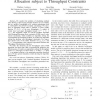Free Online Productivity Tools
i2Speak
i2Symbol
i2OCR
iTex2Img
iWeb2Print
iWeb2Shot
i2Type
iPdf2Split
iPdf2Merge
i2Bopomofo
i2Arabic
i2Style
i2Image
i2PDF
iLatex2Rtf
Sci2ools
INFOCOM
2005
IEEE
2005
IEEE
Optimal utility based multi-user throughput allocation subject to throughput constraints
— We consider the problem of scheduling multiple users sharing a time-varying wireless channel. (As an example, this is a model of scheduling in 3G wireless technologies, such as CDMA2000 3G1xEV-DO downlink scheduling.) We introduce an algorithm which seeks to optimize a concave utility function i Hi(Ri) of the user throughputs Ri, subject to certain lower and upper throughput bounds: Rmin i ≤ Ri ≤ Rmax i . The algorithm, which we call the Gradient algorithm with Minimum/Maximum Rate constraints (GMR) uses a token counter mechanism, which modifies an algorithm solving the corresponding unconstrained problem, to produce the algorithm solving the problem with throughput constraints. Two important special cases of the utility functions are i log Ri and i Ri, corresponding to the common Proportional Fairness and Throughput Maximization objectives. We study the dynamics of user throughputs under GMR algorithm, and show that GMR is asymptotically optimal in the following sense. If, un...
Related Content
| Added | 25 Jun 2010 |
| Updated | 25 Jun 2010 |
| Type | Conference |
| Year | 2005 |
| Where | INFOCOM |
| Authors | Matthew Andrews, Lijun Qian, Alexander L. Stolyar |
Comments (0)

